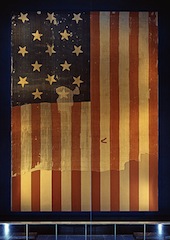“The Land of the Free and the Home of the Brave”
How does the history of the U.S. national anthem reflect the country’s long struggle with racial, economic and gender inequality?
July 4, 2013

It is well known that Francis Scott Key is the author of the famous words “the land of the free and the home of the brave.” He wrote those words in 1814 and, ever since 1931, they have been sung as the national anthem of the United States.
What is far less known are his views on race.
In his career as lawyer and public servant, Key spoke publicly of Africans in America as “a distinct and inferior race of people, which all experience proves to be the greatest evil that afflicts a community.”
He saw them as a shiftless and untrustworthy population — a nuisance to white people.
Key believed the solution to the slavery problem was to free the enslaved Africans and get rid of them by helping them colonize Africa. He worked on behalf of this racial dream for more than 20 years. He was, in the words of a friend, a distressingly serious man.
Key had become famous almost by accident. He wrote the “Star Spangled Banner” in September 1814 and it became immediately popular.
Amazingly, the song was the product of a humiliation. Francis Scott Key was a veteran of what some dubbed “the Bladensburg Races,” the total collapse of American forces during the British invasion of Washington in August 1814.
When the untrained American militia faced the dogged advance by British troops, backed by artillery fire, the Americans broke rank by the hundreds and then by the thousands.
They ran as fast as they could, hence the humorous reference to “The Races.” Most simply ran back toward Washington, including Lieutenant Key. In the Bladensburg Races, Francis Scott Key was a sprinter.
Seeking to redeem his battlefield failure, Key negotiated with British forces that had arrested a family friend.
In his effort to secure his friend’s release, he managed to join him aboard a British ship as the fleet bombarded Fort McHenry in Baltimore harbor.
On September 14, 1814, the British proved their prowess in the spectacular and useless display of military power by pummeling the fort with bombs.
The Americans did not return fire. But they did hang a red, white and blue flag out. At dawn — much to everyone’s surprise — the British had not breached the fort’s walls and the flag was still there.
Key decided to write a patriotic song. He fitted his words to a popular English drinking club song called, “To Anacreon in Heaven.” Originally, the song had four stanzas, although only one is sung today. In the now-forgotten final stanza, Key wrote:
Then conquer we must when our cause it is just/And this be our motto: “In God is our Trust.”/And the Star-Spangled Banner in triumph shall wave/O’er the land of the free and the home of the brave.”
In Key’s formative lyrics, America would conquer in the name of a just god.
After the defense of Fort McHenry, the War of 1812 came to a close — Britain had defeated France in Europe and did not care to bother further with the Americans.
If the United States had not won the War of 1812, it had not lost it either. Americans were free — white Americans, that is.
Key’s name spread throughout the United States because of the popularity of “the Star Spangled Banner.” The song was sung everywhere, though it would not formally be adopted as the national anthem of the United States for another century.
The designation of the “Star-Spangled Banner” as the national anthem was the culmination of a 15-year lobbying campaign a century later led by veterans’ organizations that overcame resistance from New England and from pacifists who criticized the song’s militaristic imagery.
In 1930, Congressman John Linthicum, a Democrat from Baltimore, introduced a bill to designate the Star Spangled Banner as the national anthem.
Wide majorities of the House and the Senate approved it a year later and President Herbert Hoover signed the bill into law on March 3, 1931.
But the words that ring in every American’s ears about freedom and bravery take on new meaning when one looks further into the Washington summer of 1835.
Continue to the second part of this essay.
Editor’s note: This essay is based on and contains excerpts from the author’s book, Snow-Storm in August, The Struggle for American Freedom and Washington’s Race Riot of 1835 (First Anchor Books, 2013). Copyright 2012 by Jefferson Morley.
Takeaways
Francis Scott Key spoke of Africans in America as "a distinct and inferior race of people."
Key believed the solution to slavery was to free the enslaved Africans and help them colonize Africa.
If the United States had not won the War of 1812, it had not lost it either. (White) Americans were free.
Read previous

It’s Not a Conspiracy, Mr. Erdogan!
July 3, 2013
